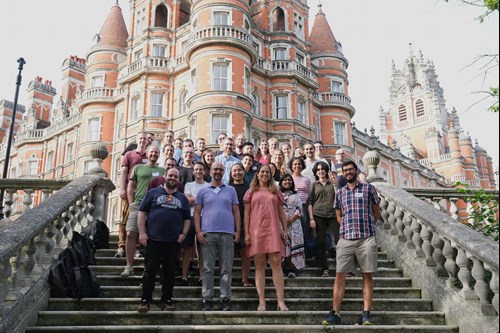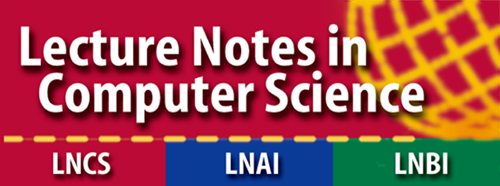Welcome to SAGT 2023
The 16th International Symposium on Algorithmic Game Theory (SAGT) will take place at Royal Holloway University of London from 4th-7th September 2023.
The purpose of SAGT is to bring together researchers from Computer Science, Economics, Mathematics, Operations Research, Psychology, Physics, and Biology to present and discuss original research at the intersection of Algorithms and Game Theory.

General Information
Scope
The program of SAGT 2023 will include invited lectures and presentations of peer-reviewed submissions. Foundational work is solicited on topics including but not limited to:
-
Auctions and pricing
-
Contract theory
-
Cooperative game theory
-
Cost-sharing algorithms and analysis
-
Decision theory
-
Efficiency of equilibria and Price of Anarchy
-
Equilibria, learning, and dynamics in games
-
Equilibrium computation and complexity
-
Fair division
-
Internet Economics
-
Incentives in Blockchain and Cryptocurrencies
-
Market design & matching markets
-
Mechanism design
-
Network games and graph-theoretic aspects of social networks
-
Reputation, recommendation and trust systems
-
Social choice and voting
-
Solution concepts in game theory
Industrial application works and position papers presenting novel ideas, issues, challenges and directions are also welcome.
The symposium proceedings will be published by Springer in its LNCS/ARCoSS series. Accepted papers will be allocated at most 18 pages in the proceedings (in particular, at most 16 pages for the technical part and at most 2 pages for references, in line with the submission guidelines). Alternatively, authors of accepted papers can choose to publish a one-page abstract in the proceedings, along with a URL pointing to the full paper.
There will be a SAGT 2023 Best Paper Award, accompanied by a prize of 1,000 EURO offered by Springer.
Important Dates and Submissions
Important Dates
- Submission Deadline: 4th May, 2023, 23:59 AoE
- Submission Deadline: 12th May, 2023, 23:59 AoE
- Notification: 1st July, 2023
- Camera Ready Deadline: 15th July, 2023
- Conference Dates: 4th-7th September, 2023
Submission Instructions
Authors are invited to submit original research for possible presentation at the conference. Each paper will be evaluated on significance, originality, technical quality, and exposition. It should clearly establish the research contribution, its relevance, and its relation to prior research.
Submission Format
Submissions must be in single-column format, with 11-point or larger fonts, using single-spacing between lines and 1-inch margins all around. For example, authors may want to use the LNCS style, with the fullpage package enabled (in LaTeX). Submissions deviating significantly from these guidelines may be rejected without review.
This year, there will be no strict page limit for submissions, and authors are encouraged to submit the full versions of their papers. Still, the details of long papers will be read at the discretion of the program committee, so the authors are strongly encouraged to structure their paper in a way that includes a clear presentation of the merits of the paper and a discussion of the importance of the results, as well as an exposition of the key conceptual and technical ideas of the paper within the first 15 pages. Submissions shorter that 15 pages are also very much welcome.
We note that accepted papers will be allocated 18 pages in LNCS format in the proceedings. Please note that the LNCS format without the fullpage package has much wider page margins.
Results previously published or presented at another archival conference prior to SAGT, or published (or accepted for publication) at a journal prior to the submission deadline, will not be considered for publication as regular papers. Simultaneous submission of regular papers to another conference with published proceedings is not allowed.
Simultaneous submission of results to a journal is allowed only if the authors intend to publish the paper as a one page abstract in SAGT 2023.
Best Paper Award
There will be a SAGT 2023 Best Paper Award, accompanied by a prize of 1,000 EURO offered by Springer.
Submission Server and Deadline
This year, the submissions will be via OpenReview, a free submission platform that has successfully hosted prestigious conferences in the field for several years. The migration from EasyChair to OpenReview is because EasyChair has moved to a rather costly subscription model.
Please submit your work via the following link.
Submission deadline: 12th May 2023, 23:59 AoE
It is expected that every accepted paper will be presented at the conference by one of the authors.
Committees
Programme Committee
- Georgios Amanatidis, University of Essex
- Vittorio Bilò, University of Salento
- Argyrios Deligkas, Royal Holloway University of London (PC co-chair)
- Eduard Eiben, Royal Holloway University of London
- Edith Elkind, University of Oxford
- Tomer Ezra, Sapienza University of Rome
- Angelo Fanelli, CNRS
- Michail Fasoulakis, ICS-FORTH
- John Fearnley, University of Liverpool
- Aris Filos-Ratsikas, University of Edinburgh (PC co-chair)
- Federico Fusco, Sapienza University of Rome
- Mingyu Guo, University of Adelaide
- Sushmita Gupta, The Institute of Mathematical Sciences
- Daniel Halpern, Harvard University
- Thekla Hamm, TU Wien Exceptional PC Member Award
- Kristoffer Arnsfelt Hansen, Aarhus University
- Tobias Harks, University of Augsburg
- Martin Hoefer, Goethe-Universität Frankfurt
- Alexandros Hollender, EPFL
- Ayumi Igarashi, University of Tokyo
- Bart de Keijzer, King's College London
- Max Klimm, TU Berlin
- Moran Koren, Ben Gurion University
- Piotr Krysta, University of Liverpool
- Rucha Kulkarni, University of Illinois at Urbana-Champaign
- David Manlove, University of Glasgow
- Pascal Lezner, Hasso Plattner Institute
- Minming Li, City University of Hong Kong
- Maria Kyropoulou, University of Essex
- Bo Li, The Hong Kong Polytechnic University
- Themistoklis Melissourgos, University of Essex
- Evi Micha, University of Toronto
- Gianpiero Monaco, University of Chieti-Pescara
- Nikos Protopappas, University of Patras
- Guido Schäfer, CWI
- Yixin Tao, LSE
- Zoi Terzopoulou, Saint-Etienne School of Economics
- Artem Tsikiridis, CWI
- Rohit Vaish, Indian Institute of Technology Delhi
- Carmine Ventre, King's College London
- Adrian Vetta, McGill University
- Cosimo Vinci, University of Salerno
Steering Committee
- Elias Koutsoupias, University of Oxford
- Marios Mavronicolas, University of Cyprus
- Dov Monderer, Technion
- Burkhard Monien, University of Paderborn
- Christos Papadimitriou, Columbia University
- Giuseppe Persiano, University of Salerno
- Paul Spirakis, University of Liverpool (chair)
Accepted papers
- Weighted Fair Division with Matroid-Rank Valuations: Monotonicity and Strategyproofness
Warut Suksompong and Nicholas Teh - Computational complexity of k-stable matchings
Haris Aziz, Gergely Csáji, and Agnes Cseh - Parameterized Complexity of Gerrymandering
Brian Lavallee, Andrew Fraser, and Blair D. Sullivan - Arbitrary Profit Sharing in Federated Learning Utility Games
Eirini Georgoulaki and Kostas Kollias - Coordinating Monetary Contributions in Participatory Budgeting
Haris Aziz, Sujit Gujar, Manisha Padala, Mashbat Suzuki, and Jeremy Vollen - The Frontier of Intractability for EFX with Two Agents
Paul W. Goldberg, Kasper Høgh, and Alexandros Hollender - Computation of Nash Equilibria of attack and defense games on networks
Stanisław Kaźmierowski and Marcin Konrad Dziubiński - Truthful Two-Facility Location with Candidate Locations
Panagiotis Kanellopoulos, Alexandros A. Voudouris, and Rongsen Zhang - Reputation-based Persuasion Platforms
Itai Arieli, Omer Madmon, and Moshe Tennenholtz - The Contest Game for Crowdsourcing Reviews
Marios Mavronicolas and Paul G. Spirakis - Maximin Fair Allocation of Indivisible Items under Cost Utilities
Sirin Botan, Angus Ritossa, Mashbat Suzuki, and Toby Walsh - Optimizing over Serial Dictatorships
Ioannis Caragiannis and Nidhi Rathi - Entrepreneurship Facility-Activation Games
Shaul Rosner and Tami Tamir - Fair Algorithm Design: Fair and Efficacious Machine Scheduling
April Niu, Agnes Totschnig, and Adrian Vetta - EFX Allocations for Indivisible Chores: Matching-Based Approach
Yusuke Kobayashi, Ryoga Mahara, and Souta Sakamoto - Single-Peaked Jump Schelling Games
Tobias Friedrich, Pascal Lenzner, Louise Molitor, and Lars Seifert - Repeatedly Matching Items to Agents Fairly and Efficiently
Ioannis Caragiannis and Shivika Narang - Robustness of Participatory Budgeting Outcomes: Complexity and Experiments
Niclas Boehmer, Piotr Faliszewski, Łukasz Janeczko, and Andrzej Kaczmarczyk - Threshold Mechanisms for Dynamic Procurement with Abandonment
Ali Khodabakhsh, Evdokia Nikolova, Emmanouil Pountourakis, and Jimmy Horn - Strategy-proof Budgeting via a VCG-like Mechanism
Jonathan Wagner and Reshef Meir - The Price of Equity with Binary Valuations and Few Agent Types
Umang Bhaskar, Neeldhara Misra, Aditi Sethia, and Rohit Vaish - Stackelberg Vertex Cover on a Path
Katharina Eickhoff, Lennart Kurt Kauther, and Britta Peis - Computational Complexity of Decision Problems about Nash Equilibria in Win-Lose Multi-Player Games (BEST PAPER)
Vittorio Bilò, Kristoffer Arnsfelt Hansen, and Marios Mavronicolas - Into the Unknown: Assigning Reviewers to Papers with Uncertain Affinities
Cyrus Cousins, Justin Payan, and Yair Zick - Decentralized Attack Search and the Design of Bug Bounty Schemes
Fikri Pitsuwan, Hans Gersbach, and Akaki Mamageishvili - Diversity-seeking jump games in networks
Yasaman Sabbagh Ziarani and Lata Narayanan
Invited Speakers
- George Christodoulou, Aristotle University of Thessaloniki
- Michal Feldman, Tel-Aviv University
- Alex Teytelboym, University of Oxford
Tutorials
Game Theoretic Aspects of Blockchain Systems, given by Evangelos Markakis from Athens University of Economics and Business and IOG and Philip Lazos from IOG
FairACAC
The 2023 Workshop on Fair Resource Allocation: Concepts, Algorithms and Complexity will be held in conjunction with the 16th Symposium on Algorithmic Game Theory (SAGT 2023). The workshop will take place on Monday, 4 September.
Event Information
Technical Programme
The detailed schedule (pdf version) can be found here
Monday 4 September (Windsor Ground Floor)
10.00 - 11.00 Registration
11.00 - 17.00 Workshop on Fair Resource Allocation: Concepts, Algorithms and Complexity (SAGT 2023 Satellite Workshop)
11.00 - 13.00 Talks
13.00 - 14.00 Lunch Break (on your own)
14.00 - 17.00 Talks
18:00 - 20:00 Opening Reception (Picture Gallery)
Tuesday 5 September (Windsor Ground Floor)
9.00 - 11.00 Tutorial
11.00 - 11.30 Coffee Break
11.30 - 12.30 Invited Talk (Alex)
12.30 - 14.00 Lunch
Session 1 - Fair Division
14.00 - 14.20 Maximin Fair Allocation of Indivisible Items under Cost Utilities
14.20 - 14.40 EFX Allocations for Indivisible Chores: Matching-Based Approach
14.40 - 15.00 The Frontier of Intractability for EFX with Two Agents
15.00 - 15.20 The Price of Equity with Binary Valuations and Few Agent Types
15.20 - 15.50 Coffee Break
Session 2 - Matching and Assignment
15.50 - 16.10 Computational complexity of k-stable matchings
16.10 - 16.30 Repeatedly Matching Items to Agents Fairly and Efficiently
16.30 - 16.50 Optimizing over Serial Dictatorships
16.50 - 17.10 Into the Unknown: Assigning Reviewers to Papers with Uncertain Affinities
Wednesday 6 September (Windsor Ground Floor)
Session 3 - Complexity in Games
10.00 - 10.20 The Contest Game for Crowdsourcing Reviews
10.20 - 10.40 Computation of Nash Equilibria of attack and defense games on networks
10.40 - 11.00 Stackelberg Vertex Cover on a Path
11.00 - 11.30 Coffee Break
11.30 - 12.30 Invited Talk (Michal)
12.30 - 14.00 Lunch Break
Session 4 - Mechanism Design
14.00 - 14.20 Truthful Two-Facility Location with Candidate Locations
14.20 - 14.40 Weighted Fair Division with Matroid-Rank Valuations: Monotonicity and Strategyproofness
14.40 - 15.00 Threshold Mechanisms for Dynamic Procurement with Abandonment
15.00 - 15.20 Strategy-proof Budgeting via a VCG-like Mechanism
15.20 - 15.50 Coffee Break
Session 5 (Best paper award)
15.50 - 16.20 Computational Complexity of Decision Problems about Nash Equilibria in Win-Lose Multi-Player Games
16.20 - 17.00 SAGT Business Meeting
18:00 - 21:00 Conference Dinner (Picture Gallery and North Quad)
Thursday 7 September (QUEENS Lecture Theatre)
Session 6 - Algorithm Design, Information Design and Equilibria
10.00 - 10.20 Fair Algorithm Design: Fair and Efficacious Machine Scheduling
10.20 - 10.40 Reputation-based Persuasion Platforms
10.40 - 11.00 Decentralized Attack Search and the Design of Bug Bounty Schemes
11.00 - 11.30 Coffee Break
11.30 - 12.30 Invited Talk (George)
12.30 - 14.00 Lunch Break
Session 7 - Computational Aspects and Efficiency in Games
14.00 - 14.20 Single-Peaked Jump Schelling Games
14.20 - 14.40 Diversity-seeking jump games in networks
14.40 - 15.00 Arbitrary Profit Sharing in Federated Learning Utility Games
15.00 - 15.20 Entrepreneurship Facility-Activation Games
15.20 - 15.50 Coffee Break
Session 8 - Computational Complexity in Social Choice
15.50 - 16.10 Parameterized Complexity of Gerrymandering
16.10 - 16.30 Coordinating Monetary Contributions in Participatory Budgeting
16.30 - 16.50 Robustness of Participatory Budgeting Outcomes: Complexity and Experiments
Proceedings
The proceedings of SAGT 2023 can be found here; the content will be freely available from September 2 to October 2, 2023.
Registration
- Regular Registration: Early £230 (by August 15th), Late £280
- Student Registration: Early £180 (by August 15th), Late £230
All SAGT 2023 participants have a guaranteed accommodation at the in-campus University Halls. These rooms can be booked from here.
History of SAGT
- SAGT 2022, Colchester
- SAGT 2021, Aarhus
- SAGT 2020, virtual event
- SAGT 2019, Athens
- SAGT 2018, Beijing
- SAGT 2017, L'Aquila
- SAGT 2016, Liverpool
- SAGT 2015, Saarbrücken
- SAGT 2014, Patras
- SAGT 2013, Aachen
- SAGT 2012, Barcelona
- SAGT 2011, Salerno
- SAGT 2010, Athens
- SAGT 2009, Paphos
- SAGT 2008, Paderborn
Logistics
Venue and travel
Address
Royal Holloway, University of London
Egham Hill
Egham
Surrey
TW20 0EX
Royal Holloway is situated in Egham, Surrey, just two miles from junction 13 of the M25 and a mere fifteen minutes from Heathrow airport. It is also easily accessible from London City or Gatwick airports.
There is a reasonable bus service from London Heathrow, Terminal 5 to Royal Holloway, which stops on Egham Hill, just outside the gates to the main entrance of the University.
There are frequent train services from London Waterloo via Clapham Junction and Richmond to Egham (35 – 40 minutes).
Download a copy of our campus map.
Accessibility
You can view accessibility information for Royal Holloway here.
Accommodation
Royal Holloway offers a wide range of affordable accommodation on site with availability in premium ensuite (double bedded room) and in standard single bedrooms (non-ensuite). This accommodation is located within easy walking distance of the conference venue and may be suitable for delegates.
All SAGT 2023 participants have a guaranteed accommodation at the in-campus University Halls. These rooms can be booked from here.
In addition, there are many local hotels at a close distance to campus, should delegates wish to stay off-site. These include:
Travelodge Egham (0.8 miles)
Great Fosters (1.4 miles)
Beaumont House (2.1 miles)
Premier Inn Staines-upon-Thames (2.7 miles)
The Boleyn Hotel Staines-upon-Thames (3.2 miles)
Mercure Staines-upon-Thames (3.2 miles)
Bridge Hotel (5.3 miles)
Crown Hotel (5.5 miles)
Code of conduct
In an effort to combat bullying, discrimination, and harassment, SAGT 2023 endorses the code of conduct outlined in appendix D of the Report from the Ad hoc committee to Combat Harassment and Discrimination in the Theory of Computing Community.


























